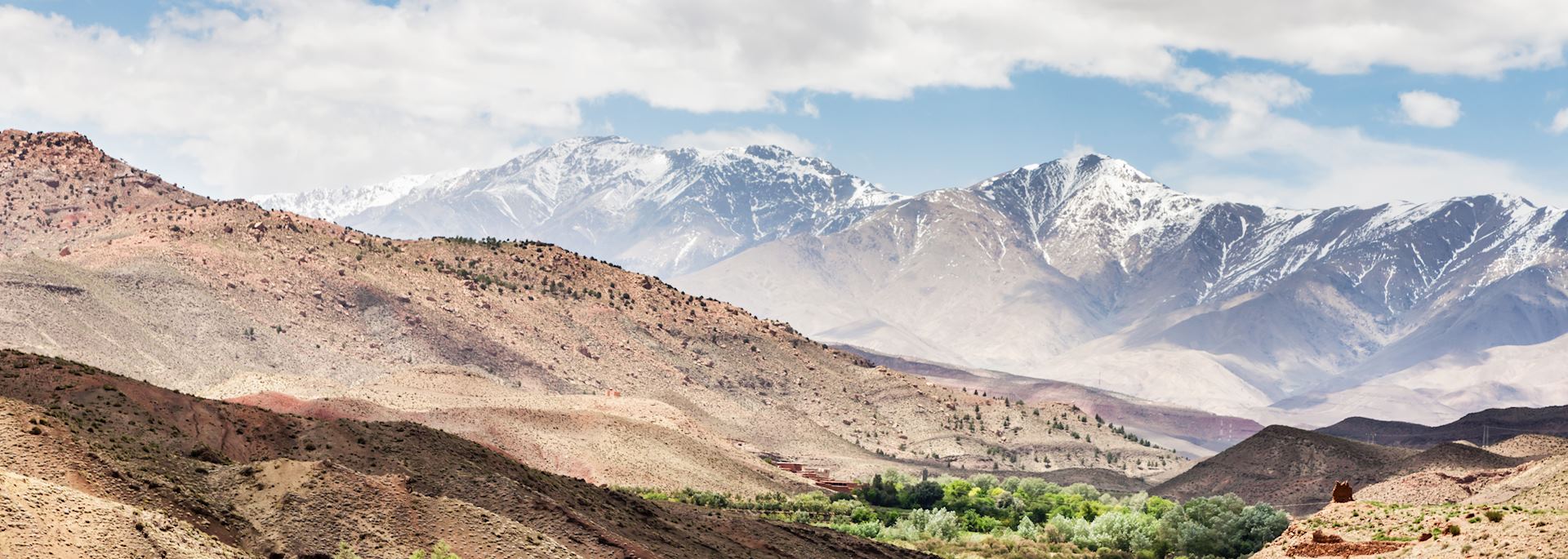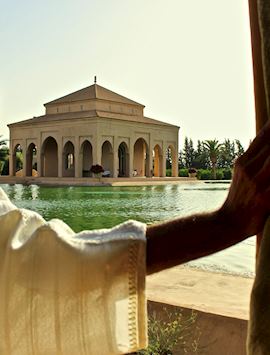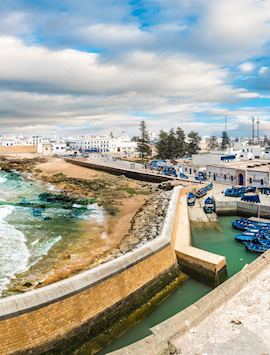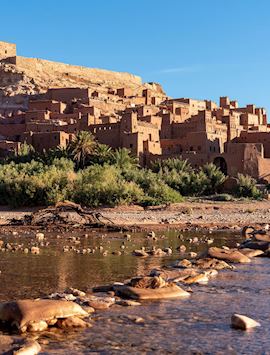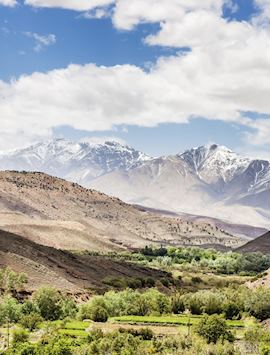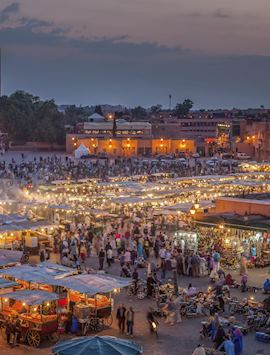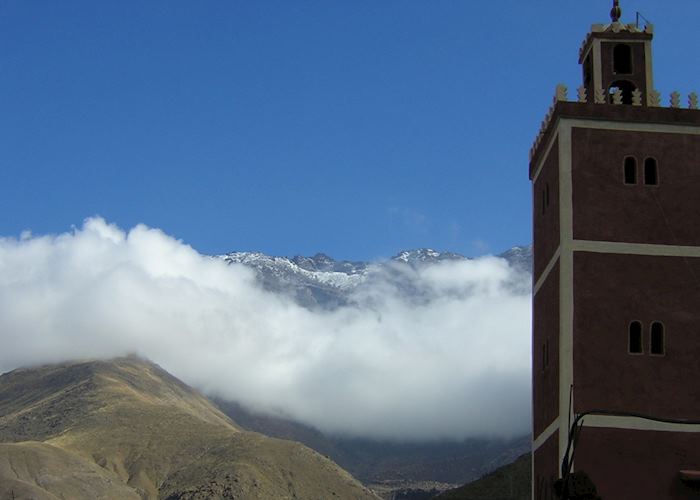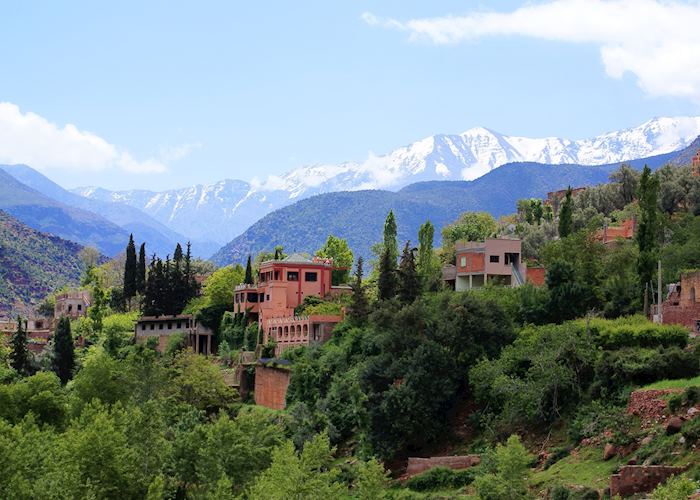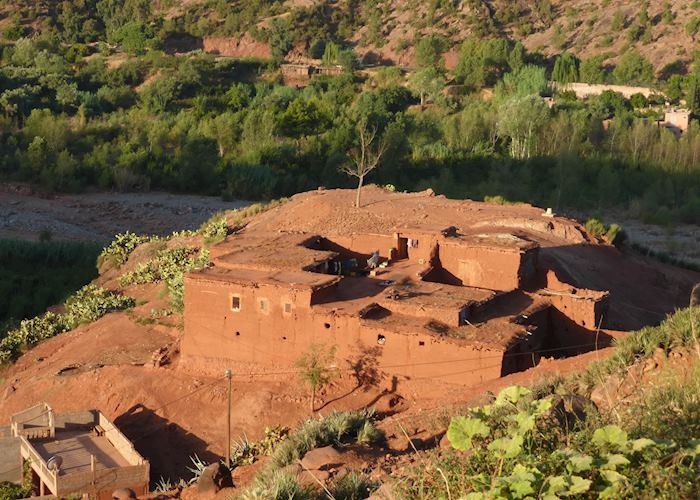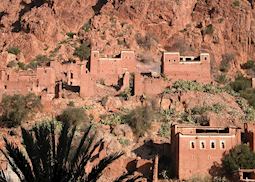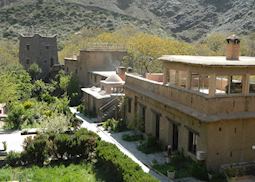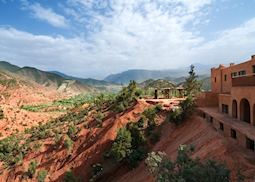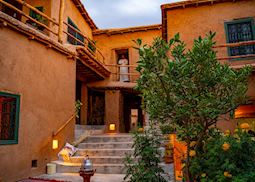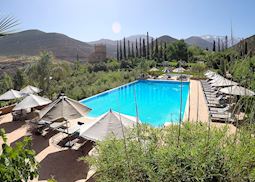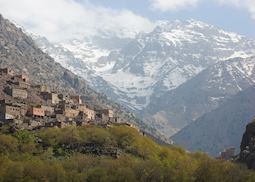Jump to:
Fertile valleys, networks of hiking paths, remote Amazigh villages and snow-smeared peaks across North Africa's highest mountain range.
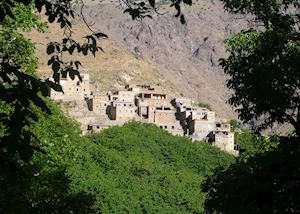 The three ranges of the Atlas Mountains create a striking, sometimes harsh barrier between the arid Sahara and Morocco’s milder coastal climate. The middle of these ranges, the High Atlas Mountains, begins close to the Atlantic in Agadir and run in a jagged line northeast through the country, encompassing some of the region’s most authentic pockets of culture as well as offering some of its best opportunities for walking.
The three ranges of the Atlas Mountains create a striking, sometimes harsh barrier between the arid Sahara and Morocco’s milder coastal climate. The middle of these ranges, the High Atlas Mountains, begins close to the Atlantic in Agadir and run in a jagged line northeast through the country, encompassing some of the region’s most authentic pockets of culture as well as offering some of its best opportunities for walking.
The mountains’ broad russet slopes are dotted with scrubby pines and lacy cedars, and the peaks gleam with snow even in the warmer months. Dirt roads and narrow footpaths snake through the otherwise pristine landscape, and in the moist, green valleys you’ll wind past herds of goats, wild herbs and small, remote villages.
Hiking in the Atlas Mountains
A 90-minute drive from Marrakesh, the range is easy to visit and you can opt to explore on foot or in a 4x4. If you choose to hike, there are a variety of routes you can take, from moderate walks to challenging multi-day treks.
One of the most rewarding hikes is up the slopes of Mount Toubkal, the highest point in North Africa. The three-day climb to its soaring summit (4,167 m or 13,671 ft) requires a good level of fitness but no technical expertise. And, at the wind-scoured top, you’re rewarded with seemingly endless vistas of crags and valleys retreating into the distance-hazed horizon.
Visit traditional Amazigh villages
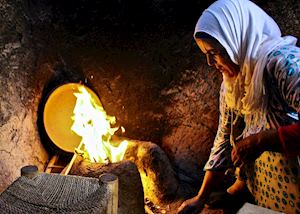 The Amazigh are the original inhabitants of these vast mountains and their civilisation reaches back more than eight millennia. Their traditional flat-roofed homes, made from packed stone and earth, seem to have grown from the mountains themselves. They make a living farming and herding livestock, using age-old techniques to live in the fertile valleys between the forbidding slopes.
The Amazigh are the original inhabitants of these vast mountains and their civilisation reaches back more than eight millennia. Their traditional flat-roofed homes, made from packed stone and earth, seem to have grown from the mountains themselves. They make a living farming and herding livestock, using age-old techniques to live in the fertile valleys between the forbidding slopes.
The modern world has little impact on the villages that cling to the rocky slopes. When you visit, you’ll see a way of life that’s largely unchanged over thousands of years. Because their lives are so closely tied to the mountains, Amazigh are respectful of the land. This sustainable attitude translates even to the hotels that have sprung up in the past few decades, ecolodges designed to limit their footprint on the rugged, but delicate, landscape.
This ancient culture is known for being particularly warm and welcoming to visitors, and you might find yourself welcomed into a home for a cup of steamy Moroccan mint tea (nicknamed le whiskey Berbere). You can also opt to spend a day with an Amazigh family, learning to bake bread, cook meals or create pottery from the red-brown clay.
Best time to visit the Atlas Mountains
The Atlas Mountains are a year-round destination. Between April and October is the best time to embark on hikes, although some may find it too hot to comfortably complete long-distance routes.
The temperature dramatically decreases in winter, and the peaks can receive downfalls of snow. This can make hiking conditions treacherous, however the scenery looks particularly impressive.
who's been there

Start planning your tailor-made trip to the Atlas Mountains by contacting one of our Morocco specialists
-
01993 838 92501993 838 420
- Make an enquiry
Suggested itineraries featuring the Atlas Mountains
Our itineraries will give you suggestions for what is possible when you travel in the Atlas Mountains, and they showcase routes we know work particularly well. Treat them as inspiration, because your trip will be created uniquely by one of our specialists.
Places in and around the Atlas Mountains
- Ourika Valley The Atlas Mountains
- Marrakesh 35 miles away
- Oued Mellah 47 miles away
- Ouarzazate 62 miles away
- Taroudant 73 miles away
- The Southern Oases Valleys 79 miles away
- Skoura 82 miles away
- The Draa Valley 109 miles away
- Essaouira 113 miles away
- The Dades Valley 116 miles away
- The Souss-Massa National Park 123 miles away
- Zagora 136 miles away
- The Anti Atlas 164 miles away
- Casablanca 172 miles away
- Rabat 210 miles away
- The Erg Chebbi 234 miles away
- Meknes & Volubilis 236 miles away
- Fez 266 miles away
Photos of the Atlas Mountains
Our expert guides to exploring the Atlas Mountains
Written by our specialists from their own experiences of visiting the Atlas Mountains, these guides will help you make the most of your time there. We share both our practical recommendations and the best ways to appreciate the Atlas Mountains at its best.
-
Walking and trekking holidays in Morocco ![Trekking in the High Atlas Mountains]()
Walking and trekking holidays in Morocco
Walking and trekking holidays in Morocco
Home to North Africa's highest mountain and the stunning Ourika Valley, Morocco is the perfect choice for a walking or trekking holiday in North Africa. We can advise you on the best places to stay to make the most of these wonderful walking opportunities.
Read this guide -
Family holidays in Morocco ![Berber village in Ameln Valley, The Anti Atlas, Morocco]()
Family holidays in Morocco
Family holidays in Morocco
A vibrant and diverse country, Morocco is a very family-friendly destination with plenty of hands-on experiences and quirky accommodation options for families. Morocco specialist Kerry explains how to get the most out of your time here.
Read this guide -
Riads and kasbahs of Morocco ![Riad Lydines, Marrakesh]()
Riads and kasbahs of Morocco
Riads and kasbahs of Morocco
A stay in a riad or kasbah offers intimacy, style, character and charm, and is undoubtedly a highlight of any trip to Morocco. Here at Audley we can recommend traditional accommodation to suit your preferences.
Read this guide
Accommodation choices for the Atlas Mountains
We've selected a range of accommodation options for when you visit the Atlas Mountains. Our choices usually come recommended for their character, facilities and service or location. Our specialists always aim to suggest properties that match your preferences.
-
![Kasbah du Toubkal, High Atlas, Morocco]()
Kasbah du Toubkal
Atlas Mountains -
![Kasbah Angour, High Atlas Mountains]()
Kasbah Angour
Atlas Mountains -
![Kasbah Bab Ourika, The High Atlas Mountains]() Responsible ChoiceWe've hand-selected a range of tours and stays across the world that go above and beyond to be a force for good by supporting local businesses, educating staff, challenging local norms, or promoting conservation and biodiversity efforts. Your Responsible Choice helps increase the positive impact of your trip.
Responsible ChoiceWe've hand-selected a range of tours and stays across the world that go above and beyond to be a force for good by supporting local businesses, educating staff, challenging local norms, or promoting conservation and biodiversity efforts. Your Responsible Choice helps increase the positive impact of your trip.Kasbah Bab Ourika
Atlas Mountains -
![Amanay Home]() Responsible ChoiceWe've hand-selected a range of tours and stays across the world that go above and beyond to be a force for good by supporting local businesses, educating staff, challenging local norms, or promoting conservation and biodiversity efforts. Your Responsible Choice helps increase the positive impact of your trip.
Responsible ChoiceWe've hand-selected a range of tours and stays across the world that go above and beyond to be a force for good by supporting local businesses, educating staff, challenging local norms, or promoting conservation and biodiversity efforts. Your Responsible Choice helps increase the positive impact of your trip.Amanay Home
Atlas Mountains -
![Kasbah Tamadot, High Atlas Mountains]()
Kasbah Tamadot
Atlas Mountains
Ideas for experiencing the Atlas Mountains
Our specialists seek out authentic ways to get to know the places that could feature in your trip. These activities reflect some of the experiences they've most enjoyed while visiting the Atlas Mountains, and which use the best local guides.
-
High Atlas Mountains trek ![The High Atlas Mountains, Morocco]()
High Atlas Mountains trek
High Atlas Mountains trek
Arrive in the village of Tassa Ouirgane, situated near the Toubkal National Park at an altitude of 1,200 m. From here starts the hiking through forests of oaks and juniper trees to Azzaden Valley.
View details

